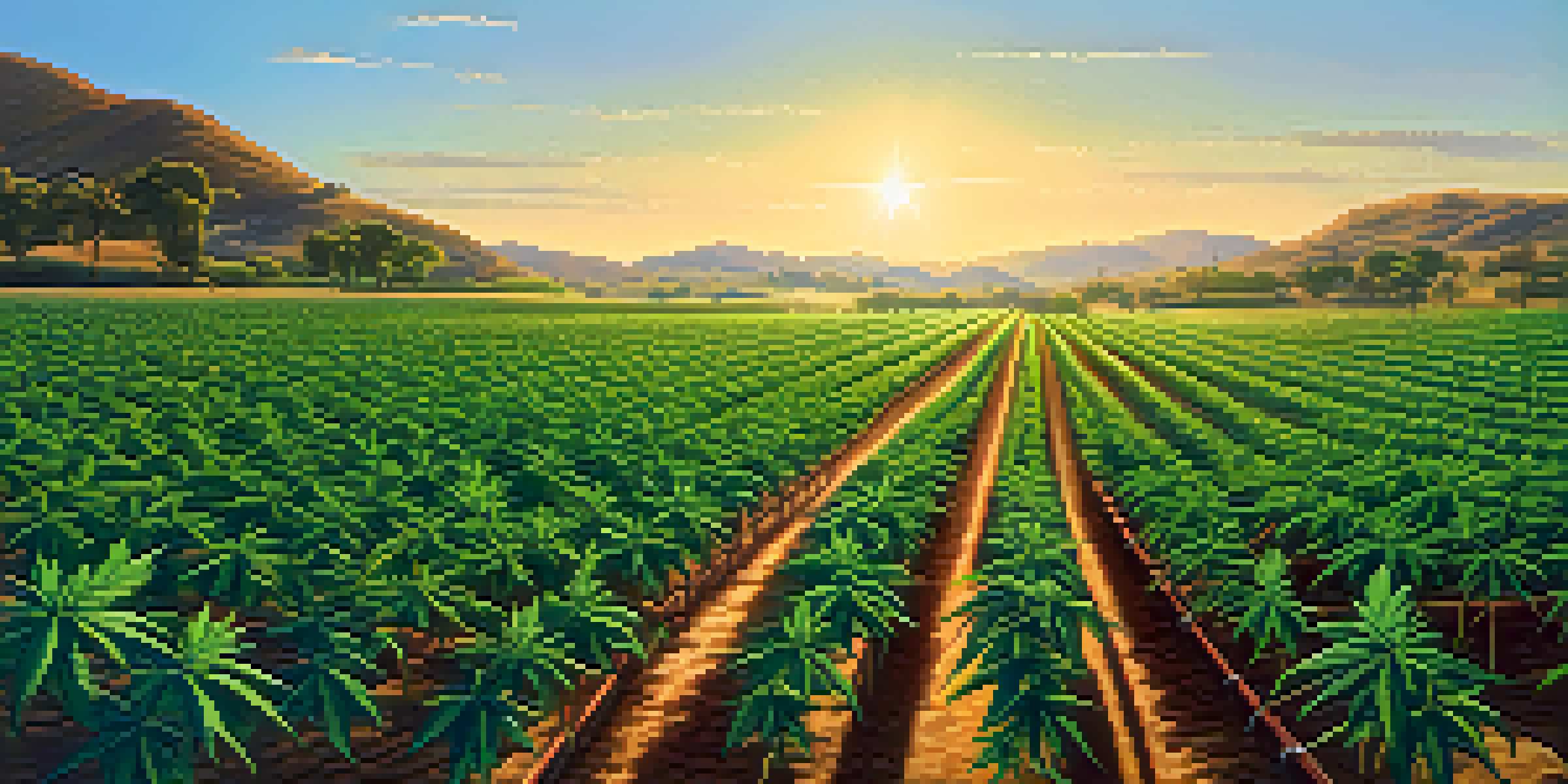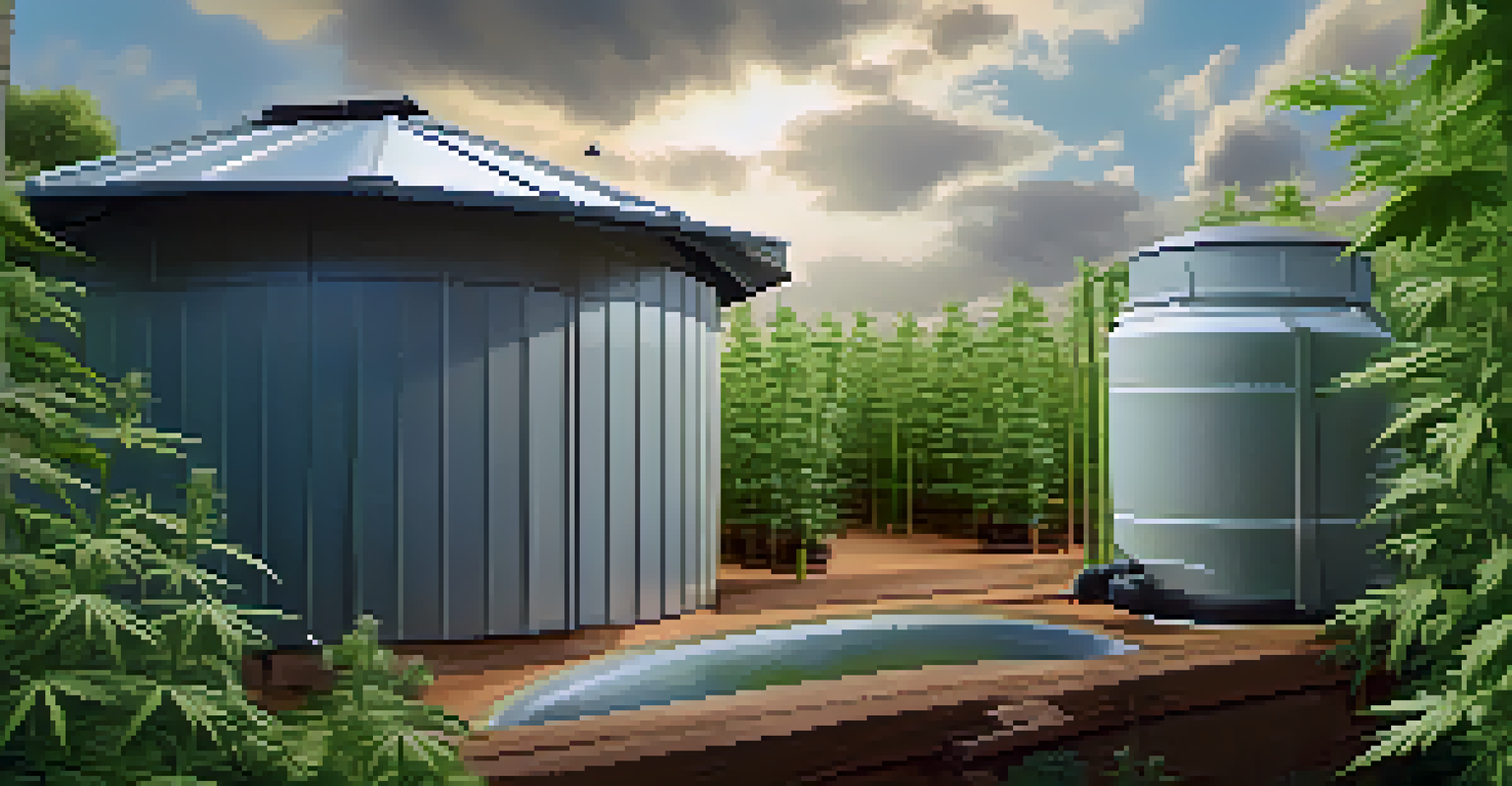Water Conservation Techniques in Cannabis Farming Practices

Understanding the Importance of Water Conservation
Water is a vital resource for cannabis farming, impacting plant health and yield. With increasing concerns about water scarcity, it's crucial for growers to adopt conservation techniques. By understanding the importance of water conservation, farmers can not only protect the environment but also enhance their sustainability practices.
Water is the driving force of all nature.
Implementing water-saving techniques can lead to healthier plants and potentially higher yields. This is particularly important in regions prone to drought or water restrictions. The benefits extend beyond just the immediate crop; conserving water helps preserve local ecosystems and reduces the overall carbon footprint of farming.
Moreover, consumers are increasingly favoring sustainably grown cannabis. Implementing effective water conservation practices not only makes good environmental sense but can also enhance a brand's reputation. Ultimately, the commitment to sustainability can become a significant selling point in the competitive cannabis market.
Rainwater Harvesting for Cannabis Farms
Rainwater harvesting involves collecting and storing rainwater for later use in irrigation. This technique is cost-effective and can significantly reduce the dependency on municipal water sources. By installing rain barrels or larger storage tanks, cannabis farmers can take advantage of natural precipitation.

Implementing this technique requires careful planning, such as determining the best collection areas and ensuring proper filtration. For instance, setting up a system to direct roof runoff into storage containers can maximize water capture. This not only conserves water but also reduces soil erosion and runoff, benefiting the entire farm ecosystem.
Water Conservation Enhances Yields
Adopting water-saving techniques not only protects the environment but also leads to healthier cannabis plants and potentially higher yields.
In regions with variable rainfall, farmers can establish a backup water source to supplement their rainwater collection. This dual approach ensures that cannabis plants receive the necessary hydration throughout different growth stages. In essence, rainwater harvesting can be a game-changer for sustainable cannabis farming.
Drip Irrigation: Efficient Water Use
Drip irrigation systems deliver water directly to the base of plants, minimizing evaporation and runoff. This technique allows for precise control over water application, ensuring that cannabis plants get just the right amount they need. It's an efficient solution that can lead to significant water savings compared to traditional methods.
The greatest threat to our planet is the belief that someone else will save it.
For example, a well-designed drip system can reduce water usage by up to 50% while promoting healthier root systems. This localized watering approach helps prevent over-saturation and encourages deep root growth, which can improve overall plant vitality. As a result, growers can enjoy enhanced yields without the excessive water consumption.
Moreover, drip irrigation systems can be automated using timers and moisture sensors. This technology enables farmers to optimize watering schedules based on real-time data, further enhancing water conservation efforts. Ultimately, investing in drip irrigation can pay off in both water savings and crop quality.
Mulching: Retaining Soil Moisture
Mulching involves covering the soil around cannabis plants with organic or inorganic materials. This practice helps retain soil moisture by reducing evaporation, which is especially beneficial in hot climates. By applying a layer of mulch, farmers can create a more stable moisture environment for their crops.
Organic mulches, like straw or wood chips, not only conserve water but also improve soil health as they decompose. They add nutrients and enhance soil structure, leading to better drainage and aeration. This creates a thriving ecosystem for beneficial microbes, which can further support plant health.
Rainwater Harvesting Saves Costs
Implementing rainwater harvesting allows cannabis farmers to reduce dependency on municipal water sources while maximizing natural precipitation.
In addition to moisture retention, mulching helps suppress weeds that compete for water and nutrients. By minimizing weed growth, cannabis farmers can reduce the need for herbicides, leading to a more organic and sustainable farming approach. Overall, mulch is a simple yet effective technique for conserving water in cannabis cultivation.
Soil Health and Its Role in Water Conservation
Healthy soil plays a crucial role in water conservation for cannabis farming. Well-structured soil can hold more moisture, reducing the need for frequent irrigation. Practices like composting and cover cropping enhance soil health, promoting better water retention and reducing erosion.
For instance, adding organic matter to the soil improves its ability to absorb and retain water. This means that during dry spells, cannabis plants can access moisture stored deep within the soil. Farmers who prioritize soil health often find that their crops require less water overall, resulting in both cost savings and environmental benefits.
Moreover, testing soil regularly can help farmers understand its moisture-holding capacity and nutrient levels. This knowledge allows for more informed irrigation decisions, tailoring water application to the specific needs of the crop. By focusing on soil health, cannabis farmers can create a sustainable foundation for their water conservation efforts.
Using Technology to Optimize Water Use
Technology plays a vital role in modern cannabis farming, especially in managing water resources. Tools like moisture sensors and smart irrigation systems can help farmers monitor soil conditions in real-time. By utilizing these technologies, growers can apply water more efficiently and reduce waste.
For example, a moisture sensor can alert farmers when soil levels are low, allowing for targeted irrigation. This means that water is only applied when necessary, preventing overwatering and encouraging deeper root growth. As a result, plants become more resilient and require less water overall.
Technology Optimizes Water Use
Utilizing technologies like moisture sensors and smart irrigation systems enables growers to apply water more efficiently, reducing waste and promoting sustainability.
Additionally, data analytics can provide insights into weather patterns and water usage, helping farmers make informed decisions. By adopting these technologies, cannabis growers can not only conserve water but also improve overall crop management. Embracing innovation is a key step towards sustainable cannabis farming.
Educating the Community on Water Conservation
Education is essential in promoting water conservation practices among cannabis farmers and the broader community. By sharing knowledge about effective techniques and the importance of water preservation, farmers can inspire others to adopt similar practices. Workshops, local events, and online resources can serve as platforms for this education.
For instance, collaborating with agricultural extension services or local universities can provide valuable training sessions. These initiatives can cover topics like irrigation efficiency, soil health, and the benefits of rainwater harvesting. Educating the community not only fosters a culture of sustainability but also enhances collective efforts toward water conservation.

Moreover, sharing success stories from local cannabis farms can motivate others to take action. When farmers see tangible results from water-saving techniques, they may be more inclined to implement them on their own farms. Ultimately, community education is a powerful tool in promoting a sustainable future for cannabis farming.
The Future of Water Conservation in Cannabis Farming
As the cannabis industry continues to grow, the need for sustainable water practices becomes increasingly crucial. Future farming methods will likely focus even more on efficiency and conservation, driven by both environmental necessity and consumer demand. Innovative solutions will emerge, paving the way for a more sustainable approach to cannabis cultivation.
For example, advancements in biotechnology may lead to the development of cannabis strains that require less water. Additionally, improvements in irrigation technology will continue to provide farmers with tools to optimize their water usage. This innovation will not only benefit individual growers but also contribute to the industry's overall sustainability.
Water Conservation is Vital
Effective water conservation techniques enhance plant health and sustainability in cannabis farming.
The collective commitment to water conservation will help ensure the longevity of cannabis farming. By prioritizing sustainable practices now, farmers can safeguard their future and the environment. In conclusion, embracing water conservation techniques is essential for a thriving cannabis industry.